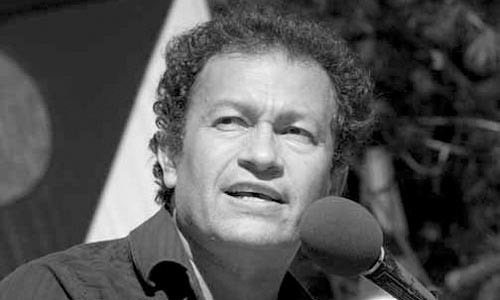Hector Aristizabal didn't need the "war on terror" to wrestle with the moral implications of torture: He's been carrying his own torture story since 1989. As a university student in Medellin, Colombia in the early 1980s, Aristizabal was arrested by police and tortured by the army under what he describes as "a national security law ... to persecute people they consider subversive."
His 72-hour torture included sleep-, food- and water-deprivation, mock executions and electrical cables attached to his testicles. "What they did to me was a lot of techniques that wouldn't leave marks on the body," he says.
His torturers hung him by his arms from behind -- "Your entire body feels like when your leg goes to sleep. And then when they hit you, it's entirely painful." They also submerged his head in a bucket of water. "They left me inside until I thought I would drown."
Eventually, he was able to emigrate to America, even though, "I blamed this country for the ransacking of our resources and support of our army." But the American public, he discovered, was more ignorant than belligerent.
Aristizabal is trying to challenge that ignorance: He's one of several torture victims, witnesses and critics who will speak, conduct workshops and even present theater about their views on torture at the Talking About Torture conference. Panelists say the conference, which is being held in Pittsburgh Sept. 20-21, is necessary because torture has gone from a proscribed practice to official Bush administration policy, with media complicity -- even cheerleading.
In fact, it was finally the well-publicized photographs from Abu Ghraib that propelled Aristizabal, an actor by trade, to turn his story into theater. The impetus "was mostly the reaction that society had -- 'This is not who we are, and that's just a few bad apples.' I said no, this is consistently this country's policy in the world."
Helen Gerhardt of Highland Park, saw Abu Ghraib from close up. Gerhardt, a sergeant in the Army National Guard, did a year-long stint in Iraq that ended in July 2004, during which time "Men from my transportation company delivered water on a regular basis to Abu Ghraib," she says. "A few of the men tried to tell me what they had been seeing there, and I had a lot of trouble taking it in."
But when pictures from this U.S. prison became public, she says, "I felt compelled" to speak out. Iraqis "believed a lot of our rhetoric ... and then we ended up behaving just like" deposed dictator Saddam Hussein. "The kind of stony rage we felt, driving out of that camp after the news broke, that was real terror. And it felt like deserved terror.
"I and other veterans have a responsibility to educate people about the Geneva Conventions" -- the international agreement that prohibits torture -- "and a responsibility to make reparations for that behavior," she concludes.
Gerhardt will lead the anti-torture conference's main session, which seeks new ways to challenge public ideas about its use. Participants will discuss ways to approach the topic when dealing with the media, legislators, political candidates and religious communities, as well as approaches to educating children about the subject, and to confronting the use of torture in prisons.
Meeting Iraqis in person, Gerhardt says, helped to humanize them for her fellow soldiers. "[I]f we personalize those whom we torture, with histories and families, then this brutality is less likely to happen."
Aristizabal is telling his own story for just that reason.
"I was never involved with any political group but I was a sympathizer," Aristizabal says. And by 1989, many friends had disappeared. By then, he says, "you [didn't] know who is doing the killing -- the army, guerrilla groups, paramilitary death squads or the mafia." Shortly after Aristizabal came to America, his brother, who had remained behind, was tortured and killed. "It was horrific. It filled me once again with the urge to kill, to destroy," Aristizabal says. He turned instead to psychotherapy and private ritual.
The play he now performs for many activist and church groups is intended to raise public consciousness about torture -- and humanize its victims.
"[T]hey experience me ... instead of 'that communist, subversive guy who was tortured somewhere.' I don't want to convince them of anything. I'm just inviting them to look at the situation and do something about it."
Aristizabal may have an uphill battle. A Mercer University poll released Sept. 11 shows that 57 percent of one mainstream American group -- white Southern evangelicals -- believe torture is justified to gain information.
But "[t]orture does not exist to gather intelligence," Aristizabal counters. "Torture is created to raise fear in the population: 'If you continue doing or thinking this, this could happen to you.'" After his play, Aristizabal leads the audience in "dynamic meditation," which includes breath and body exercises. "Then we go cuckoo for a minute," letting out trapped feelings. "And then we dance," he adds. "In that way we come back to life."
More information on Talking About Torture, including a detailed schedule: www.pittsburghagainsttorture.org/september20















